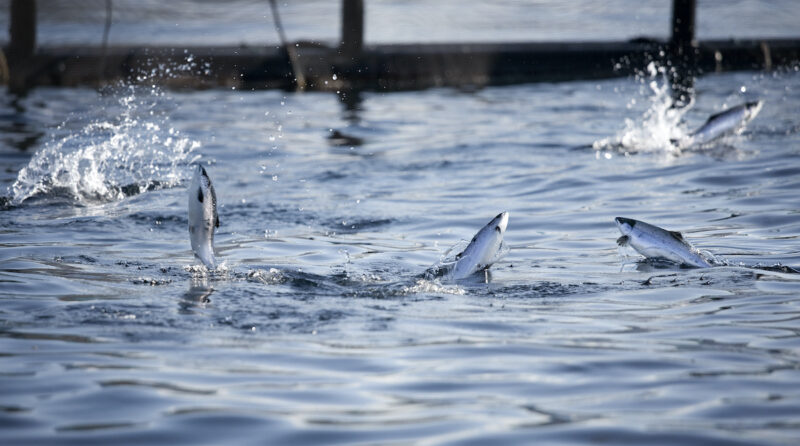New science gives a boost to salmon aquaculture in BC’s Discovery Islands
Eight scientific studies have shown ocean-based salmon aquaculture poses minimal risk to wild stocks in BC’s Discovery Islands. But that is not enough for the anti-salmon farm activists, so here is number 9
By Fabian Dawson
SeaWestNews
Atlantic salmon farms in the Discovery Islands off BC pose no more than a minimal risk to the health of wild stocks migrating through the area, another scientific study has found.
This is the ninth report on the risk of pathogen transfer to Sockeye salmon from salmon farms in the Discovery Islands, which was released today amidst an activist campaign to oust fish farms from BC’s oceans.
Eight previous studies also concluded that aquaculture farms pose no more than minimal risk of serious harm to the health of migrating Sockeye salmon, said the Department of Fisheries and Oceans.
The latest study concluded that it is extremely unlikely that juvenile and adult Fraser River Sockeye salmon would become infected with VHSV (viral haemorrhagic septicaemia virus Iva) released from farmed Atlantic Salmon in the Discovery Islands area, because Sockeye Salmon are not susceptible to VHSV.
“The magnitude of consequences to the abundance and diversity of Fraser River Sockeye Salmon are both estimated as negligible,” stated the Canadian Science Advisory Secretariat (CSAS).
The government will now begin consultations with the Holmalco, Klahoose, Komoks, Kwiakah, Tla’amin, We Wai Kai (Cape Mudge) and Wei Wai Kum (Campbell River) First Nations about the aquaculture sites in the Discovery Islands. The information exchanged will inform the government’s decision on whether or not to renew aquaculture licenses in the area, prior to the December-2020 deadline, DFO said in a statement.
“This government is committed to an area-based management approach to aquaculture, and we recognize the concerns raised by partners that these particular farms may not be the best fit for this location nor for the adjacent communities. We will be consulting with each First Nation within the Discovery Islands area, and the information and views they provide will inform my decision on whether or not to renew licences for these farms this December, and in the future,” said Bernadette Jordan, Minister of Fisheries, Oceans and the Canadian Coast Guard, in a statement.
Most of the juvenile Sockeye that head to sea from the Fraser River travel through the waters around Discovery Islands where about 18 salmon farms operate.
Refusing to believe voluminous scientific evidence, including the one released today, that show salmon farms have minimal impact on wild fish, the anti-fish farm activists have begun ratcheting up their campaign to decimate BC’s ocean aquaculture industry, as the province heads towards a fall election.
They honed in on one of 75 recommendations by the Cohen Commission which called for the Minister of Fisheries and Oceans to prohibit net-pen salmon farming in the Discovery Islands this fall, unless it is “satisfied that such farms pose at most a minimal risk of serious harm to the health of migrating Fraser River sockeye salmon.”
The $37-million Cohen Commission inquiry which was launched in response to the sharp decline of Fraser River sockeye in 2009, found “no smoking gun” for the decline in wild stocks and listed a variety of reasons including climate change and warming oceans.
But the activists continue blaming fish farms as the primary reason for the declining wild stocks, including this year’s low Fraser River sockeye returns.
Last week, claiming the support of many First Nations that do not depend on aquaculture, the activists held a press conference spouting falsehoods about BC’s salmon farmers, cloaking their assertions in treaty rights and threatening to disrupt one of Canada’s most sustainable and secure food sources.
Twenty BC First Nations have partnership agreements for farming salmon in their territories resulting in 80% of all salmon farmed in BC falling under a beneficial partnership with a First Nation.
Farmed Atlantic salmon is BC’s top international food export at $562 million playing a key role in the local and sustainable food supply, while supporting about 7,000 full-time, year round jobs near rural and remote Vancouver Island, Central Coast, and Sunshine Coast communities.
The activists have also been falsely claiming that there has been a record number of sea lice infestations in BC during the recent salmon outmigration period and that salmon farms are infecting wild salmon with this naturally occurring parasite.
Responding to a question from SeaWestNews at a press conference this morning, a DFO official said that, other than two minor infractions that had virtually no impact on wild stocks, sea lice in BC during the 2020 outmigration have been controlled.
Studies have shown that, in B.C. regardless of the presence or absence of salmon farms, there is wide variability in sea lice prevalence in coastal locations. Research over the past decade shows lice levels are significantly linked with ocean conditions and variations in wild hosts.
(Image courtesy of Cermaq)

